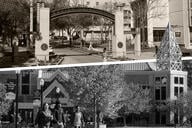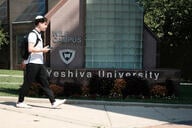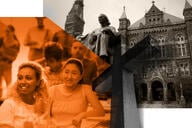You have /5 articles left.
Sign up for a free account or log in.
At New Saint Andrews College, students toss around Latin terms and sometimes don black robes. Academic terms have proper names: Jerusalem, Nicea, Chalcedon and Westminster. The curriculum, mostly primary source readings, is based on Harvard University’s -- from the 17th century.
The details are meant to create an atmosphere of reverential tradition, but New Saint Andrews, founded in 1994, is as new as its name suggests. The college and its founders see themselves as drawing inspiration from a purer time in higher education, before specialized majors, large lecture halls, prime-time football games and much of the rest of the popular image of the American university. They are also on the vanguard of a new movement with the ambitious goal of reshaping Christian higher education.
That movement calls itself “classical Christian” education, and it combines a Great Books curriculum -- featuring primary source documents from the Western tradition, but few or no specialized majors -- with a theologically conservative, Protestant Christian perspective.
Since its beginnings in elementary and secondary schools, the idea has caught on at the college level: in the 17 years since New Saint Andrews opened in Moscow, Idaho, at least six other such colleges have sprung up across the country, including New College Franklin in Tennessee, Patrick Henry College in Virginia and Imago Dei College in California. Other colleges, including Biola University, have started classical programs within the institution, and another stand-alone college, San Elijo, also in California, plans to enroll students as early as 2012. As many as 20 more new colleges may be under consideration, said Doug Wilson, one of the founders of New Saint Andrews and a proponent of the movement.
To the devout faculty and students at classical Christian colleges, the institutions represent a rebirth in American higher education, turning away from public universities some disparage as "government schools" and from the more established Christian colleges they see as too secularized or insufficiently academic. But these colleges aren't without controversy. Two educators involved with the founding of two of them -- New Saint Andrews and New College Franklin -- have drawn criticism for statements and publications that are seen as intolerant, theocratic or neo-Confederate, though the criticism has been limited to the founders themselves and not the colleges they created.
The institutions themselves differ in some important ways, including how much specialization they offer (Patrick Henry offers majors in government, journalism, history and literature, as well as a classical curriculum) and their faith requirements for students (most require some sort of written faith statement, though Gutenberg College does not). But they have much in common, including a staunch opposition to much of modern higher education -- in some cases, even the concept of a residential campus.
They try to disprove a common stereotype of conservative Christians, and their schools, as anti-intellectual, presenting a proudly esoteric face to the world and boasting of a rigorous curriculum.
"One of our concerns is that Christianity in America has kind of decided that they should withdraw from the intellectual sphere," says David Crabtree, president of Gutenberg College, which does not describe itself with the phrase “classical Christian” but combines a Great Books curriculum with a Christian perspective. "We need to establish that Christianity is indeed intellectually defensible."
Christianity at the Center
The most obvious analogy to the classical Christian colleges is St. John's College, whose campuses in Annapolis and Santa Fe also focus on reading classic texts. But describing an institution like New Saint Andrews as a "Christian St. John's" misses how central faith is to the classical Christian experience, college presidents and observers say.
In emphasizing the importance of learning the classics over career-oriented specialization, the leaders often sound like their counterparts at secular colleges. “We’ve made the mistake in the contemporary university setting of reducing education to simply downloading information,” says Roy Atwood, the president of New Saint Andrews, who was previously a professor of journalism and director of the School of Communication at the University of Idaho. “It’s not about the formation of the individual as much as acquiring data.”
The colleges emphasize their professors' Christian faith alongside or above their academic credentials. New Saint Andrews, where many of the faculty belong to Christ Church Moscow, part of the Confederation of Reformed Evangelical Churches, boasts that more than half of its teachers serve as ministers or pastors: "They have strong academic credentials and teaching experience in their respective disciplines, of course, but more importantly, as Christian spouses and parents themselves, they cherish the responsibility and privilege of nurturing the next generation," the college's website reads. At New College Franklin, faculty are encouraged to research and to publish, says Matthew Vest, the college's dean. But living alongside students is their most important priority.
“There is no doubt that they are deeply religious institutions -- I’d be tempted to say in every way, all of the time,” says Samuel Schuman, who wrote about New Saint Andrews in his 2009 book on religious colleges, Seeing the Light (Johns Hopkins University Press). “What they read, they read from the perspective of their religious outlook. What they pick to read, they pick because of the light it shows on their religious outlook.”
The distinctions are perhaps most evident in matters of science: statements of faith at the classical Christian colleges contain assertions that would be heresy at most secular institutions, most notably a belief that the world was created in six 24-hour days and a disavowal of Darwinian evolution.
New Saint Andrews offers courses on "Natural History," which include instruction in biology, and Darwin is on the college's reading list, as he is at New College Franklin. Gutenberg offers a seminar that focuses specifically on modern science and Darwin
"The quadrivium kind of assumes the world has an order to it and there is a creator behind that order,” Vest says, referring to the subjects that formed the core of the medieval university: arithmetic, geometry, music and astronomy. “Studying arithmetic gives us insight into numbers, and geometry gives us insight into space. Those are ways of knowing the world, ways of understanding the world.”
As at many religious institutions, students are expected to follow a code of conduct. At New Saint Andrews, students must pledge in writing a commitment to “personal holiness, sound doctrine, cultural reformation, and academic integrity,” the college writes on its website. Those who embrace “historic or contemporary doctrinal errors” -- a list that ranges from Arianism, a doctrinal dispute that dates from the third century, to feminism and skepticism -- must offer to withdraw from college. Gutenberg's requirements are more succinct: students who live on-campus must avoid irresponsible drinking, drug use and premarital sex, and "agree to pursue kindness in their dealings with one another."
Few of the students at the colleges come from a public school background. Classical Christian education began at the elementary and secondary levels in the early 1980s, when Wilson started a school in Moscow that adhered to classical principles of learning. Many students at the colleges spent their formative years learning in this educational tradition, and many others were home schooled; in his book, Schuman estimated that less than 5 percent of the students at New Saint Andrew's had spent significant time in the public school system.
For these students, their college experience is equally distinctive. At Gutenberg, housing is open both to the college's students and to other young people in Eugene, Ore, who are interested in the college's activities. New College Franklin believes in the possibility of "residential colleges" that would be structured like a family home, but hasn't yet built any. New Saint Andrews takes a vehement stance against a residential campus, choosing to have students live with families in the Moscow, Idaho, area. Dorms, the college argues, "breed immaturity, immorality and irresponsibility," and were originally intended to foster socialism.
New Saint Andrews sees its opposition to the norms of typical higher education as a central focus, Schuman says, describing the college's views on dormitories as "defiantly different."
"A big part of their definition is how they kind of see the rest of the world as opposing them," he says, adding the officials at the college "would have no trouble defining themselves as warriors in the culture wars."
Controversial Founders
In some cases, that role has gone beyond promoting Christianity and traditional values. Wilson, one of the founders of New Saint Andrews, has been called a neo-Confederate; among his more than 30 books and pamphlets that outline his perspective on Christianity is one, "Southern Slavery as it Was," that bills itself as a defense of "Biblical" slavery. It argues that taking the Bible literally means embracing it all, even slavery: "The Bible permits Christians to own slaves, provided they are treated well," wrote Wilson and his co-author, Steve Wilkins, a former board member of the League of the South, in the 1996 pamphlet.
“The ‘peculiar institution’ of slavery was not perfect or sinless, but the reality was a far cry from the horrific descriptions given to us in modern histories, which are often nothing more than a hackneyed reworking of abolitionist propaganda," the two men wrote.
The pamphlet, and a conference in Moscow that followed in 2003, provoked an outcry. Professors at the University of Idaho wrote a rebuttal, “Southern Slavery as it Wasn't.” The Southern Poverty Law Center wrote a report on Wilson and his friends and connections, including George Grant, the founder of New College Franklin and a frequent presenter at Wilson's history conferences. It was headlined “Taliban on the Palouse?” -- a reference to the region where New Saint Andrews is located
Wilson says the pamphlet was intended to be a rebuttal of all forms of abolitionism, including the extreme fringe of the anti-abortion movement that advocated killing doctors who performed abortions and who he said portrayed themselves as the anti-slavery movement’s successor.
“We wrote ‘Southern Slavery as it Was’ for two basic reasons,” Wilson says now. “One, to show that violence and revolution doesn’t really fix everything: there’s a biblical way to do these things, not a violent way to do these things.”
The second motive is more opaque: In publishing the pamphlet, he says now, he aimed to stop himself from being commercialized. “After the Holy Spirit starts to do something promising, the suits and haircuts move in,” he says. “I wanted to make myself unmarketable. That part of it was a wild success.”
The founder of New College Franklin, Grant, has been accused in the past of advocating for Christian domination of government based on Biblical law, a movement known as Reconstructionism. "Christians have an obligation, a mandate, a commission, a holy responsibility to reclaim the land for Jesus Christ – to have dominion in the civil structures, just as in every other aspect of life and godliness," Grant wrote in a 1987 book, Changing of the Guard: Biblical Principles for Political Action. "But it is dominion that we are after. Not just a voice." Grant and Wilson also contributed to a textbook, The War Between the States: America's Uncivil War, recommended by the League of the South, an organization that advocates for secession and a new Confederate States of America.
In an e-mail to Inside Higher Ed, Grant said that the quote, "when taken out of its larger context ... does indeed appear quite alarming." But he said it is in fact a call for "substantive work in the arenas of justice, mercy and humility for a complacent evangelical church," and that it had been removed from all further reprints of the book. He said he has never been an advocate of Reconstructionism, although the forward to the book appears to ally it with the movement.
"Even a cursory glance at the work I have done over the past 30 years would put the lie to the notion that I have a theocratic view of politics or culture: I have been a strong advocate of the civil rights, First Amendment rights, and rights of conscience for all," he wrote in the email.
Wilson, who is a member of the New Saint Andrews faculty, estimates that less than half of his time is devoted to the college. His views are incorporated into the curriculum only when he teaches a history course, which he said is rare. Atwood, who serves as the college’s president and its public face, is a co-founder whose publications are mostly uncontroversial articles from academic journals on journalism and mass communications.
Grant, who is listed as a permanent trustee and senior fellow as well as the chancellor of New College Franklin, teaches at the Franklin Classical School, an elementary and secondary institution he founded, leads a church and the King's Meadow Study Center, and maintains a career as a speaker.
Campus Culture
The colleges guard their independence closely. New Saint Andrews, New College Franklin and Gutenberg College don't participate in federal financial aid programs, nor are they regionally accredited, although Gutenberg College has said it might be interested in one day pursuing accreditation. They keep student bodies small -- usually fewer than 200 students -- which is one of the reasons the colleges are expanding so quickly.
Most classical Christian colleges are accredited by the Transnational Association of Christian Colleges and Schools, a federally recognized national accreditor that focuses on private Christian colleges, and New College Franklin is pursuing TRACS accreditation.
The colleges say they shun regional accreditation because they do not want to be pushed to secularize. The same is true for financial aid. "We see that as one of those things where money always comes with strings attached," Atwood says. "The government rightly says, ‘We’re funding these students, we want to make sure they’re getting their value.’ You can’t take the money and expect it not to have implications for their program."
The lack of regional accreditation keeps them out of the Council for Christian Colleges and Universities, the main organization for Protestant religious colleges. It can also present problems for students who hope to continue to graduate school, as many at the institutions do. Still, many manage to do so. The "Class Notes" of New Saint Andrews magazine, "Higher Expectations," feature many male graduates with advanced degrees, the majority in theology or philosophy. Many female graduates describe themselves as homemakers.
The colleges are proud to say that they are not for everyone. But their leaders say that their growing numbers point to a dissatisfaction with the state of American higher education.
“We do broad liberal arts education but we’re doing it from a Christian perspective, just as state or secular schools do it from their secular perspective,” Atwood says. “That’s one of those things that makes American higher educations so exciting is you’ve got all those different perspectives out there.”




